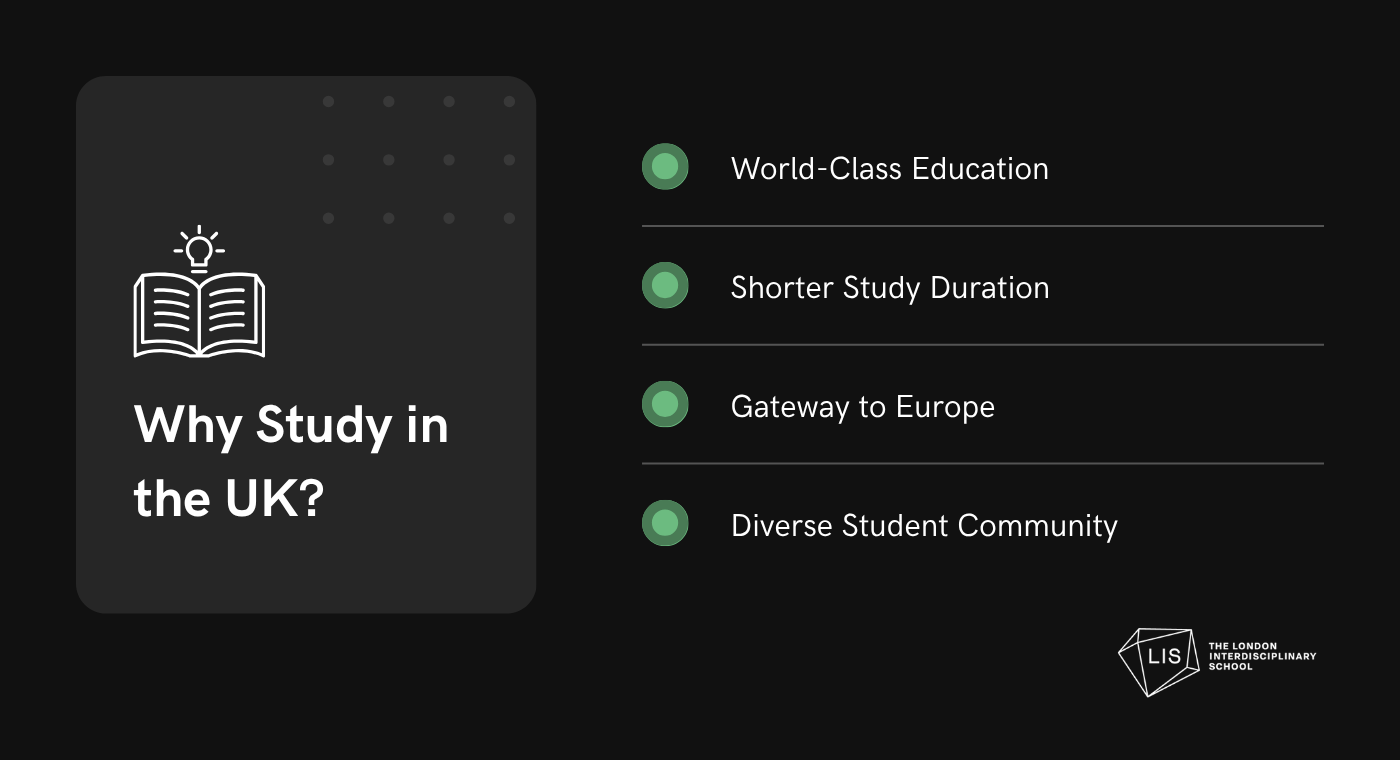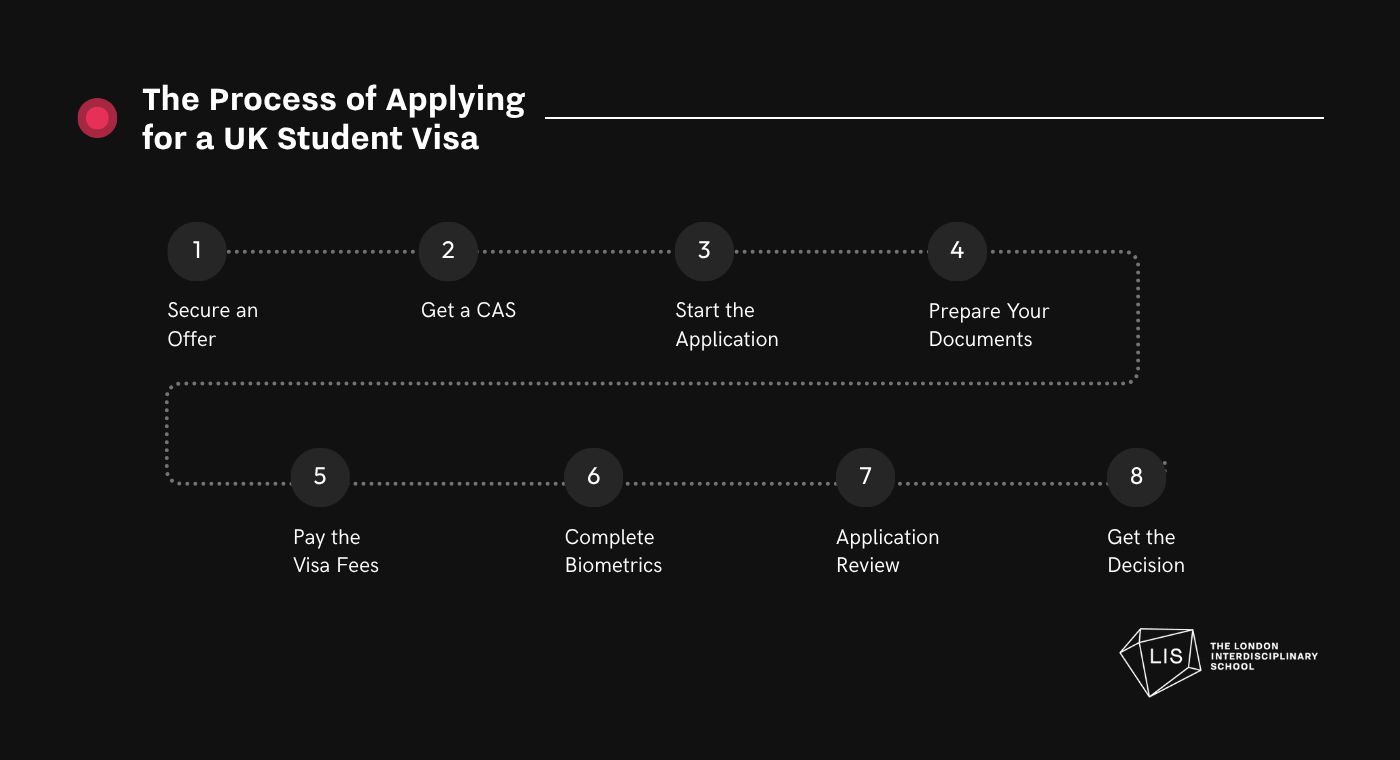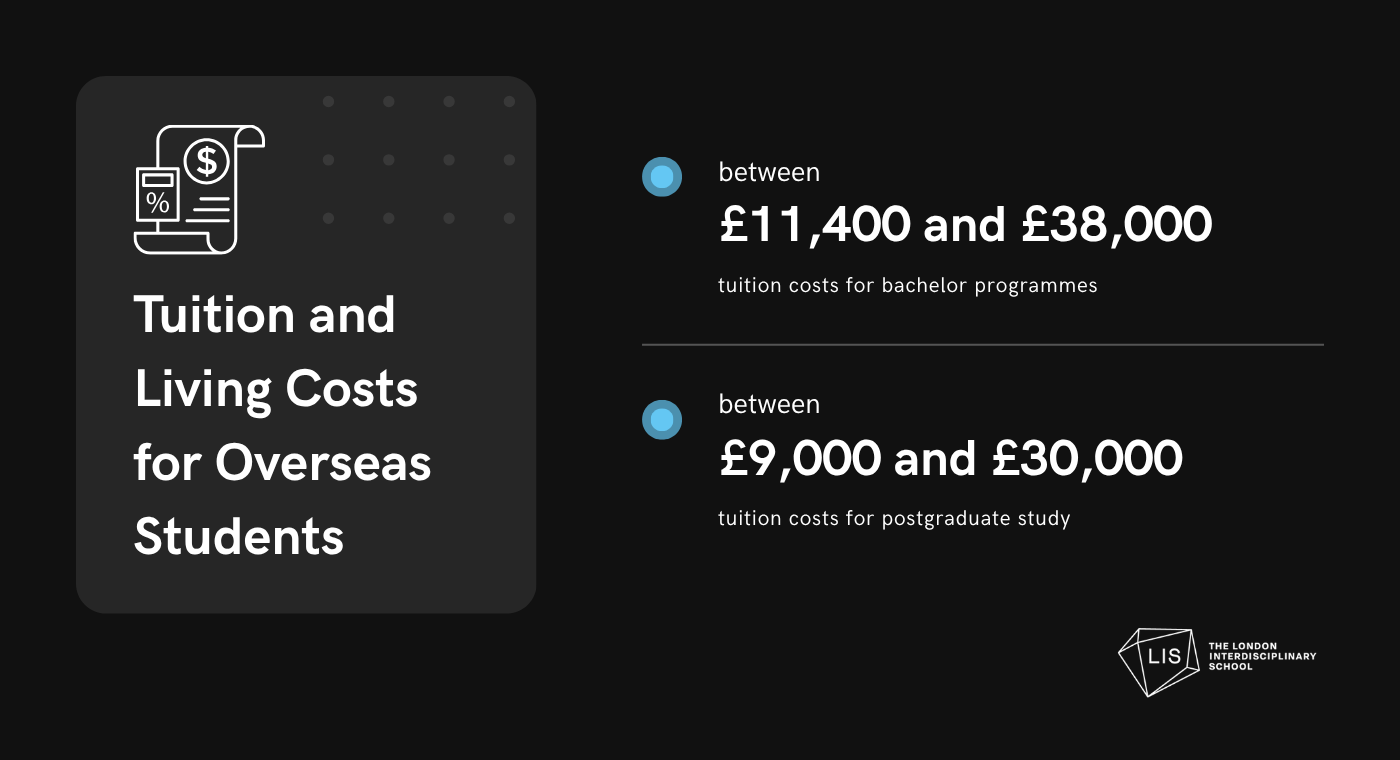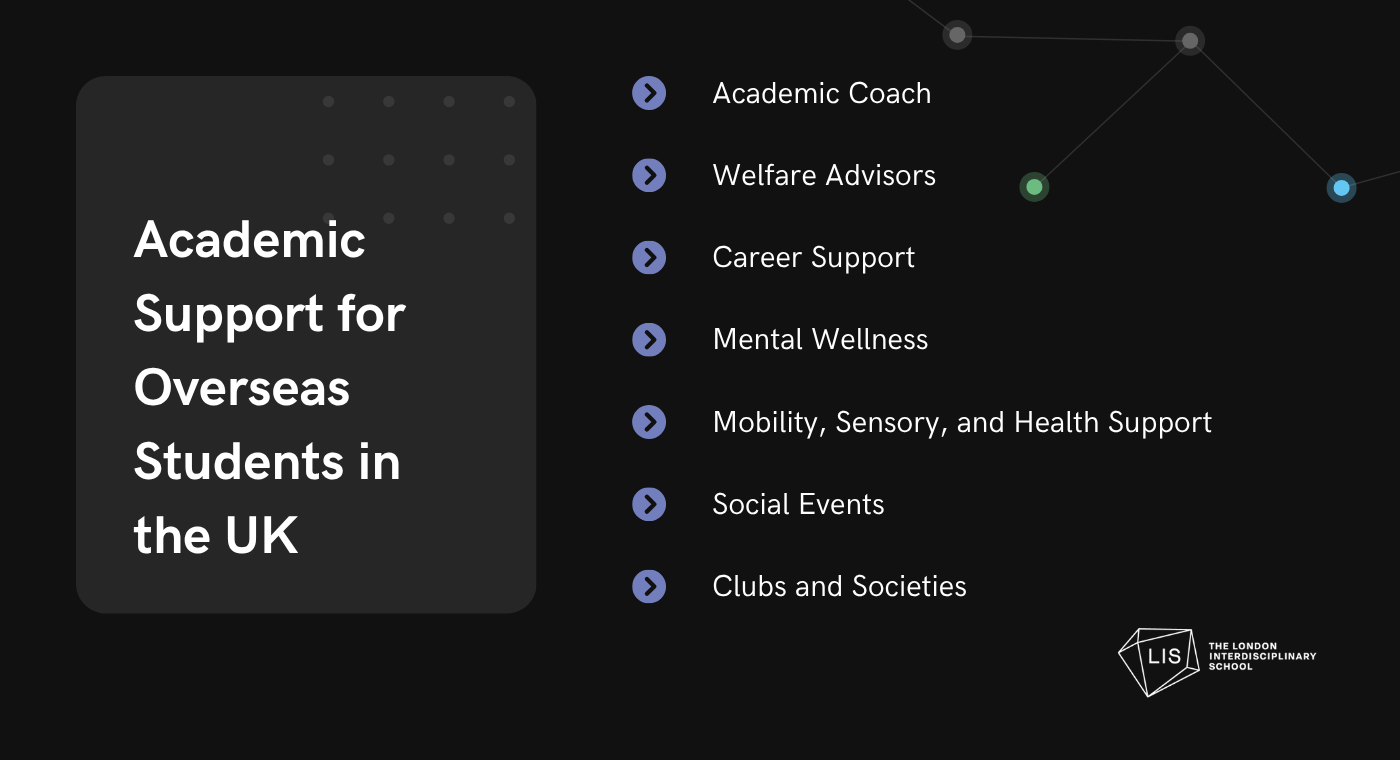International Students in the UK: A Guide on How to Apply

Many international students want to study in the UK for its world-class universities, shorter programme length, and diverse student community. However, many overseas learners need a student visa to pursue a degree programme in the UK, and there are many challenges involved in this process.
At LIS, we welcome international students and will work closely with you to determine the best path for you to succeed. This guide outlines why overseas learners should study in the UK, how to apply to a UK university, how to get a student visa, and provides valuable information on studying in the UK.
Table of Contents:
- Why Study in the UK?
- How to Apply to a UK University
- How to Get a UK Student Visa
- Tuition and Living Costs for Overseas Students
- Academic Support for Overseas Students in the UK
- Professional Opportunities for International Learners in the UK
- Study in the UK with LIS
Why Study in the UK?
There are many reasons why international students may want to study in the UK. From world-class education to shorter degree programmes, a diverse student community, and accessibility to Europe, the UK is a fantastic place for students coming from all over the world.

World-Class Education
Higher education in the UK is globally recognised for its research-oriented approach and academic excellence. Students looking for international education can find prestigious universities in the UK, like Cambridge, Oxford, and Imperial College London, among other world-renowned learning institutions.
Shorter Study Duration
Students from other countries can expect shorter degree programmes in the UK. For instance, most bachelor's pathways in the UK typically take around three years to complete, whereas these programmes require four years of study in the US. Likewise, UK master's degrees require one year of study; other countries offer these programmes for two years. While the exact time you spend studying depends on your degree and study format, programmes in the UK are typically shorter.
Gateway to Europe
Although the UK is no longer part of the EU, its geographical and cultural proximity to Europe is a significant advantage for students pursuing their studies in the EU or looking for careers in this region. Students will also find it easier to visit countries in the EU, develop industry connections, and broaden their understanding of how to immigrate and excel in the EU.
Diverse Student Community
Between 2023 and 2024, approximately 732,285 overseas students were studying in the UK, creating a multicultural and inclusive environment. In addition, for over a decade, most international learners studying in the UK are Chinese students, with the number of Nigerian students rapidly increasing. This growth rate of international students allows learners to learn about new cultures, ideas, and network with like-minded professionals worldwide.
How to Apply to a UK University
Applying to study at a UK university as an international student is a bureaucratic process that requires a lot of paperwork. For undergraduate and postgraduate applications, you can apply directly to the university you want to attend. In addition, you must gain a student visa, which we will explore in the next section.
UK Bachelor's Degree Requirements for International Students
If you're committed to studying a bachelor's degree in the UK, it's best to understand the typical entry requirements for UK bachelor's programmes:
- UK universities typically ask for strong A‑Level grades (e.g., BBB to AAA), though subject requirements vary by course and institution. For example, STEM courses often demand higher grades in specific subjects.
- Alternatively, you can apply with other qualifications like the International Baccalaureate (IB). Scores usually range from 36–38 points, with higher-level grades of 6 or 7 in key subjects.
- Applicants can also use qualifications like European Baccalaureate, STPM, Abitur, Matura. Universities require overall averages between 60–70%, with high achievement in essential subjects.
- Some universities require students to fulfil specific grade requirements in certain subjects, such as mathematics.
- English proficiency is important, and most universities require a minimum IELTS score of 6.0 or B2 on the Common European Framework Reference for languages (CEFR). Alternatively, you may need specific scores in each category of reading, writing, listening, and speaking.
If you don't fulfil the academic requirements to study for a bachelor's degree in the UK, consider completing foundation courses to expand your skill set. Fortunately, at LIS, our interdisciplinary bachelor's degree offers a flexible admissions process. Rather than focusing solely on your academic background, we consider students with practical experience.
UK Master's Degree Requirements for International Students
If you’re wondering if you should get a master’s degree in the UK, there are specific requirements you must fulfil. These are the requirements for international students to pursue a master's degree in the UK:
- A bachelor's degree equivalent to at least a UK 2:1 (upper second-class honours). This is commonly a 60–70% average or GPA ~3.0–3.5/4.0, depending on your country.
- An IELTS score between 6.5 and 7 or a TOEFL with a score of between 90 and 110.
- Official transcripts of your undergraduate degree and any prior postgraduate studies.
- Academic reference letters.
- A personal statement highlighting your interests and passion in the field you want to study.
Many universities offer pre-master's courses for students who want to complete a postgraduate degree but don't fulfil the academic requirements. It's best to consult with your chosen university to determine the best course of action for your learning pathway.
If you want to complete our master's degree at LIS, which focuses on interdisciplinary problem-solving, our admissions process supports students from all walks of life. We consider students with diverse academic qualifications and emphasise real-world experience.
How to Get a UK Student Visa
Now that you understand the entry requirements for international students who want to study a bachelor's or master's degree in the UK, you need to know how to get a UK student visa.
Obtaining a student visa is challenging; you must fulfil all the requirements and complete a rigorous process. It’s important to note that the requirements and process can change at any time, and it’s best to follow the advice on https://www.gov.uk/student-visa.
Here's an overview of the requirements for a UK student visa to ensure this process is seamless.
Documents Required for a UK Student Visa
These are the documents you will likely need to apply for a UK student visa:
- A valid passport
- A Confirmation of Acceptance for Studies (CAS) from your university
- Proof of funds to support yourself and pay for your programme if required
- A valid ATAS certificate if your programme and nationality require it
- A parental consent letter is required if you're under 18 years old
- Tuberculosis test results (mandatory if you're from a country on the UKVI TB testing list and staying >6 months)
- You need written consent if you have a sponsor to finance your course fees and living costs
- Secure English Language Test (SELT), if required
Financial Requirements for a UK Student Visa
In addition to having all the documents you need to apply for a UK degree, you must also consider the expenses. Here are the financial requirements to study a degree in the UK:
- Course Fee: You need enough money to pay for your course for up to one year. The exact amount you need to pay will be on your CAS letter.
- Money to Finance Your Expenses: Prospective students also need to show they can support their living expenses for at least 9 months.
Here’s a sample calculation for an international student who wants to study in London:
- Tuition Fee: £14,000/year
- Paid in advance: £4,000
- Living Costs: £12,006 (London)
- Total to show: £14,000 – £4,000 + £12,006 = £22,006
To secure your UK student visa, you must prove that you have these funds available for 28 consecutive days within 31 days of applying for your visa. Students who have received a student loan or scholarship must also provide evidence of this in their application.
The Process of Applying for a UK Student Visa

Once you've met all the requirements for your student visa, you can apply to begin studying.
Here's a step-by-step process of how this typically works for international students outside the UK:
- Secure an Offer: Apply to your chosen university and receive an unconditional offer.
- Candidate interview: Many universities will choose to interview an applicant, which allows the university to perform risk assessment and credibility checks, while also walking the applicant through important information.
- Get a CAS: If you accept the offer, the university will issue you a CAS.
- Start the Application: Go to the official gov.uk website and start the application process.
- Prepare Your Documents: Gather all required documents for your student visa application.
- Pay the Visa Fees: Pay the visa application fee and the Immigration Health Surcharge (IHS).
- Complete Biometrics: Visit your nearest visa application centre to provide your biometric information, including your photograph and fingerprints.
- Application Review: The UK Visas and Immigration (UKVI) centre will review your application and verify your identity.
- Get the Decision: Within eight weeks, you should get the outcome of your visa application.
Once you receive your visa, you can stay in the UK for the entire duration of your programme and arrive in the UK up to one month before your programme start date (should it run longer than six months).
Tuition and Living Costs for Overseas Students

Studying in the UK can be a significant financial commitment as an international student, so proper planning is crucial. As an overseas student, you will pay higher tuition fees than local students.
For bachelor's programmes, the tuition costs are between £11,400 and £38,000 per annum. While there are different types of master's degrees you can study, each with their own tuition costs, you can expect to pay between £9,000 and £30,000 for postgraduate study.
The exact fees you will pay depend on the university and programme you opt for. For instance, at LIS, our bachelor's degree costs £17,000 annually for international learners. On the other hand, our master's degree costs £25,000 a year for full-time international students, and £7,000 per year for two years of part-time study.
Fortunately, LIS offers bachelor's financial aid and scholarships for master's degree students to ease the financial burden. International learners can also seek financial assistance from the government to support them through graduation.
Beyond your tuition costs, you'll also have to consider living expenses in the UK. This includes:
- Accommodation: Off-campus monthly rentals outside of London can cost between £480 and £560 per month. If you're living within London, these prices shoot up to around £2,300 to £2,500 per month.
- Food and Transport: Students can expect to spend between £60 and £65 per month on transport, and food costs around £150 to £250.
- Study Materials: While it's tricky to pinpoint how much your study materials will cost, you can expect to pay about £140. It's best to confirm an accurate figure with the university you will attend.
- Social Activities: Your entertainment budget relies on how outgoing you are and what type of activities you do.
Academic Support for Overseas Students in the UK

Completing your studies in a foreign country can be emotionally and mentally challenging, as you won't have the same support structure as you would in your hometown.
However, universities in the UK often offer a wide range of academic and wellness support to guide students through their studies. For instance, LIS provides the following support and wellbeing resources to improve your learning experience in the UK:
- Academic Coach: Students can access a dedicated academic coach who will work closely with them in small groups, initiate regular meetings, and offer one-on-one support.
- Welfare Advisors: These advisors help students become familiar with their new learning environment and act as a point of contact for counselling, financial advice, and personal development workshops.
- Career Support: Career managers help provide students with the resources they need to succeed in their desired careers and secure employment after graduation.
- Mental Wellness: Students with mental health conditions, like anxiety, depression and bipolar disorder, will get the help they need to achieve.
- Mobility, Sensory, and Health Support: If students have any of these diagnoses, our support team will ensure they have the necessary resources for a successful transition.
- Social Events: Many entertaining social events integrate students into the LIS community. These events include open mic nights, film nights, and end-of-term parties.
- Clubs and Societies: Students can either join one of the clubs and societies LIS offers on campus or create one of their own.
At LIS, we understand how difficult the transition can be for international students and do our best to create a sense of community. Current students can share their experiences and guide new international students, and our faculty is always available to help you have an excellent learning experience.
Professional Opportunities for International Learners in the UK
Universities in the UK prioritise career development and networking opportunities for local and international students. You can expect networking events, internship programmes, and opportunities to work alongside real-world companies to gain hands-on experience. Many universities, including LIS, provide various career support services, including:
- Career mentorship
- Resume writing
- Networking opportunities
- Career placements
- Volunteering opportunities
However, it's critical to remember that international students on a UK student visa can only work full-time during vacation periods and part-time during term time. There may be on-campus vacancies, such as teaching or library assistants. Otherwise, you can look for employment off-campus to help fund your living experiences, provided it is aligned with what your visa allows.
Study in the UK with LIS
The UK offers ample opportunities for international students to progress through their studies. Not only are there prestigious, renowned universities in the UK, but the programmes are typically shorter than in other countries. There is also a diverse student community of overseas learners and access to the EU.
Gaining a UK study visa is a rigorous process that requires specific documents, proof of funds and a clear understanding of what is and isn't allowed during your stay. However, once you have your visa, you can join a research-oriented, success-driven community of international students.
Ready to study in the UK as an overseas learner? Contact LIS today; we can help you start your pathway to study in the UK.
Share this story
Sign up for our newsletter
Don't miss out on important updates including course information, new announcements, Open Day dates and the latest LIS news.

.png)












































.svg)

.svg)









.webp)
This is a comment related to the post above. It was submitted in a form, formatted by Make, and then approved by an admin. After getting approved, it was sent to Webflow and stored in a rich text field.